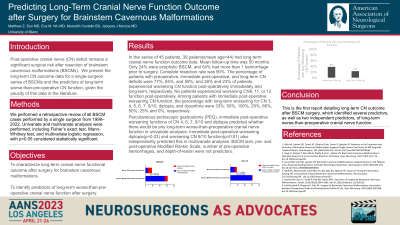Predicting Long-Term Cranial Nerve Function Outcome after Surgery for Brainstem Cavernous Malformations
Predicting Long-term Cranial Nerve Function Outcome After Surgery for Brainstem Cavernous Malformations
Friday, April 21, 2023


Matthew Z. Sun, MD
Fellow
University of Miami
Miami, Florida, United States
ePoster Presenter(s)
Introduction: Post-operative cranial nerve (CN) deficit remains a significant surgical risk after resection of brainstem cavernous malformations (BSCMs). We present the long-term CN outcome data for a single-surgeon series of BSCMs and the predictors of long-term worse-than-pre-operative CN function, given the paucity of this data in the literature.
Methods: We performed a retrospective review of all BSCM cases performed by a single surgeon from 1998–2022. Univariate and multivariate analyses were performed, including Fisher’s exact test, Mann-Whitney test, and multivariate logistic regression, with p< 0.05 considered statistically significant.
Results: In this series of 45 patients, 39 patients(mean age=44) had long-term cranial nerve function outcome data. Mean follow-up time was 50 months. Only 24% were exophytic BSCM, and 64% had more than 1 hemorrhage prior to surgery. Complete resection rate was 90%. The percentage of patients with preoperative, immediate post-operative, and long-term CN deficits were 77%, 85%, and 59%; and 38% and 23% of patients experienced worsening CN function post-operatively immediately and long-term, respectively. No patients experienced worsening CN8, 11, or 12 function post-operatively. Among patients with immediate post-operative worsening CN function, the percentage with long-term worsening for CN 3, 4, 5, 6, 7, 9/10, diplopia, and dysarthria were 33%, 50%, 100%, 29%, 66%, 50%, 25% and 0%, respectively.
Percutaneous endoscopic gastrostomy (PEG), immediate post-operative worsening functions of CN 4, 6, 7, 9/10 and diplopia predicted whether there would be any long-term worse-than-preoperative cranial nerve function in univariate analyses. Immediate post-operative worsening diplopia(p=0.03) and worsening CN 9/10 function(p=0.01) also independently predicted this in multivariate analyses. BSCM size, pre- and post-operative Modified Rankin Scale, number of pre-operative hemorrhages, and depth-of-lesion were not predictors.
Conclusion : This is the first report detailing long-term CN outcome after BSCM surgery, which identified several predictors, as well as two independent predictors, of long-term worse-than-preoperative cranial nerve function.
Methods: We performed a retrospective review of all BSCM cases performed by a single surgeon from 1998–2022. Univariate and multivariate analyses were performed, including Fisher’s exact test, Mann-Whitney test, and multivariate logistic regression, with p< 0.05 considered statistically significant.
Results: In this series of 45 patients, 39 patients(mean age=44) had long-term cranial nerve function outcome data. Mean follow-up time was 50 months. Only 24% were exophytic BSCM, and 64% had more than 1 hemorrhage prior to surgery. Complete resection rate was 90%. The percentage of patients with preoperative, immediate post-operative, and long-term CN deficits were 77%, 85%, and 59%; and 38% and 23% of patients experienced worsening CN function post-operatively immediately and long-term, respectively. No patients experienced worsening CN8, 11, or 12 function post-operatively. Among patients with immediate post-operative worsening CN function, the percentage with long-term worsening for CN 3, 4, 5, 6, 7, 9/10, diplopia, and dysarthria were 33%, 50%, 100%, 29%, 66%, 50%, 25% and 0%, respectively.
Percutaneous endoscopic gastrostomy (PEG), immediate post-operative worsening functions of CN 4, 6, 7, 9/10 and diplopia predicted whether there would be any long-term worse-than-preoperative cranial nerve function in univariate analyses. Immediate post-operative worsening diplopia(p=0.03) and worsening CN 9/10 function(p=0.01) also independently predicted this in multivariate analyses. BSCM size, pre- and post-operative Modified Rankin Scale, number of pre-operative hemorrhages, and depth-of-lesion were not predictors.
Conclusion : This is the first report detailing long-term CN outcome after BSCM surgery, which identified several predictors, as well as two independent predictors, of long-term worse-than-preoperative cranial nerve function.
